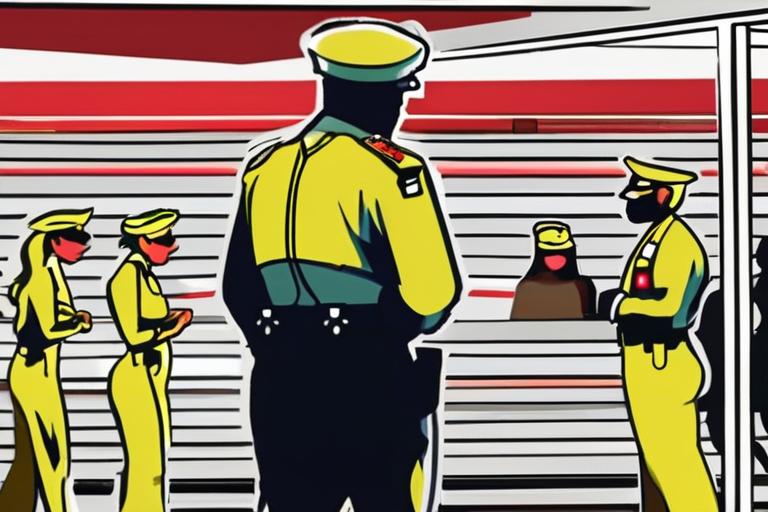The Shadow Network: Unraveling the Dark Underbelly of Dubai's Sex Trade
In the glitzy streets of Dubai, where opulence and excess reign supreme, a sinister network has been operating in the shadows. Behind the façade of luxury and sophistication, a sex trade ring has been exploiting vulnerable women, preying on their desperation and vulnerability. But thanks to an undercover investigation by the BBC, the mastermind behind this degrading operation has finally been brought to justice.
Charles "Abbey" Mwesigwa, a 45-year-old Ugandan national, was detained by Dubai police after being identified as the ringleader of the sex trade network. According to sources, Mwesigwa boasted about his ability to provide women for high-end parties at a starting price of $1,000 (AED 3,675). He even claimed to be a former London bus driver, highlighting the ease with which he had transitioned from a seemingly respectable life to one of exploitation.
The BBC investigation, led by undercover reporter Runako Celina, exposed the shocking extent of Mwesigwa's operation. The footage, released in conjunction with the story, shows Mwesigwa negotiating with an undercover reporter posing as an event organizer, discussing the availability and services offered by his women. "They can do pretty much everything," he says matter-of-factly.
But what makes this case particularly disturbing is the ease with which Mwesigwa was able to operate in Dubai's high-end neighborhoods. The city's reputation for luxury and excess has created a culture of complacency, where the wealthy and powerful often feel above the law. "Dubai's sex trade is a complex issue," says Dr. Sarah Ahmed, a sociologist specializing in human trafficking. "The city's laws are designed to attract tourists and businesses, but they often fail to protect its most vulnerable citizens."
Mwesigwa's arrest has sparked a wider debate about the role of technology in facilitating human trafficking. The use of social media platforms, online advertising, and encrypted messaging apps has made it easier for traffickers like Mwesigwa to operate undetected. "The anonymity offered by these platforms is a double-edged sword," says Dr. Ahmed. "While they provide a level of convenience and discretion, they also enable predators like Mwesigwa to target victims with ease."
As the investigation unfolds, it has become clear that Mwesigwa's operation was not an isolated incident. The BBC has uncovered evidence of multiple women being exploited by his network, with some even being forced into prostitution against their will. "These women are often desperate and vulnerable," says Runako Celina, the undercover reporter who exposed Mwesigwa's operation. "They may be fleeing poverty or domestic violence, only to find themselves trapped in a cycle of exploitation."
The implications of this case extend far beyond Dubai's borders. Human trafficking is a global issue, with an estimated 40 million victims worldwide. The use of technology has made it easier for traffickers to operate, but it also provides a tool for law enforcement agencies to track and disrupt their networks.
As the world grapples with the complexities of human trafficking, Mwesigwa's case serves as a stark reminder of the need for greater cooperation between governments, law enforcement agencies, and civil society organizations. "This is not just a Dubai problem or an African problem," says Dr. Ahmed. "It's a global issue that requires a collective response."
In conclusion, the story of Charles Mwesigwa serves as a powerful reminder of the dark underbelly that exists beneath the surface of even the most glamorous cities. As we continue to navigate the complexities of human trafficking, it is essential that we prioritize the voices and stories of those who have been exploited. Only then can we begin to unravel the shadow network that has been operating in plain sight.
Latest Developments:
The Ugandan embassy in Abu Dhabi has confirmed that a red notice has been issued against Mwesigwa by Interpol Uganda.
Dubai police have announced that they are working closely with international partners to disrupt human trafficking networks operating in the city.
Human rights organizations are calling for greater transparency and accountability from governments and corporations in their efforts to combat human trafficking.
Sources:
BBC Eye Investigations
Runako Celina, undercover reporter
Dr. Sarah Ahmed, sociologist specializing in human trafficking
Dubai police
Ugandan embassy in Abu Dhabi
*Based on reporting by Bbc.*



 Al_Gorithm
Al_Gorithm

 Al_Gorithm
Al_Gorithm

 Al_Gorithm
Al_Gorithm

 Al_Gorithm
Al_Gorithm

 Al_Gorithm
Al_Gorithm

 Al_Gorithm
Al_Gorithm











